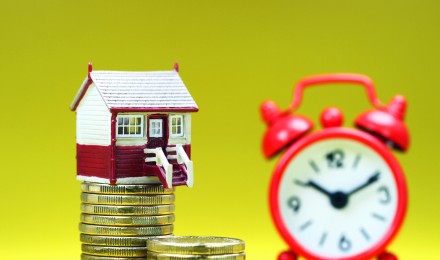Conventional or FHA? 15-year or 30-year?
This is just a sampling of questions you may ask yourself when buying a home. Since most people don’t have the bankroll to stroke a check when buying a house, they rely on financing from a mortgage lender. And with a mortgage loan comes the next biggest question – a fixed-rate or an adjustable rate?
The better mortgage option depends on a lot of factors, such as how long you plan to live in the house and what you can afford to spend monthly. There are benefits with both, but also a few drawbacks. Understanding the pros and cons of each is the first step to deciding which is the better option for you.
Adjustable Rate Mortgages – a mortgage with an interest rate that periodically adjusts to reflect fluctuations in the market.
1. Advantages:
- Adjustable-rate mortgages feature lower interest rates during the initial years, helping you qualify for a larger mortgage. It essentially increases purchasing power.
- Because the rate on an adjustable rate mortgage can rise or fall with the market, you can take advantage of lower mortgage rates without refinancing, thus saving money on closing costs.
- If you know that you’re only going to live in a house for a couple of years, an adjustable rate can save you money. It might be the better fit since you’re likely to sell the house before your first rate adjustment.
2. Disadvantages:
- An adjustable rate is a cost-effective alternative when rates are low. However, there is no way to predict future interest rates. If you’re due a rate adjustment, and interest rates have increased significantly since your previous adjustment, the new rate may send your mortgage payment through the roof, creating payment problems.
- If your adjustable rate mortgage features a fixed-rate for the initial two or three years, you may choose this option with the intent of refinancing to a permanent fixed-rate before your first rate adjustment. This approach can work. However, there is no guarantee that you’ll be able to refinance in the future. A change in your income or credit can affect a refinancing, as well as any changes to mortgage lending guidelines.
Fixed Rate Mortgages – a mortgage with a fixed interest rate throughout the life of the mortgage term.
1. Advantages:
- The primary advantage – stability. The perfect option if you don’t like surprises. The rate doesn’t change for the duration of the loan, and neither does your mortgage payment.
- Unlike adjustable rate mortgages that involve a lot of explanation, fixed-rate mortgages are simple to understand. Plus, they remove the stress of always worrying about interest rates.
2. Disadvantage:
- Unfortunately, if mortgage rates hit an all-time low, you can’t just call your lender and request a better rate. Getting a cheaper rate with a fixed-rate mortgage involves refinancing your home loan, which is basically applying for a new mortgage. And like any mortgage, there are closing costs and other expenses.
Conventional or FHA? 15-year or 30-year?
This is just a sampling of questions you may ask yourself when buying a home. Since most people don’t have the bankroll to stroke a check when buying a house, they rely on financing from a mortgage lender. And with a mortgage loan comes the next biggest question – a fixed-rate or an adjustable rate?
The better mortgage option depends on a lot of factors, such as how long you plan to live in the house and what you can afford to spend monthly. There are benefits with both, but also a few drawbacks. Understanding the pros and cons of each is the first step to deciding which is the better option for you.
Adjustable Rate Mortgages – a mortgage with an interest rate that periodically adjusts to reflect fluctuations in the market.
1. Advantages:
- Adjustable-rate mortgages feature lower interest rates during the initial years, helping you qualify for a larger mortgage. It essentially increases purchasing power.
- Because the rate on an adjustable rate mortgage can rise or fall with the market, you can take advantage of lower mortgage rates without refinancing, thus saving money on closing costs.
- If you know that you’re only going to live in a house for a couple of years, an adjustable rate can save you money. It might be the better fit since you’re likely to sell the house before your first rate adjustment.
2. Disadvantages:
- An adjustable rate is a cost-effective alternative when rates are low. However, there is no way to predict future interest rates. If you’re due a rate adjustment, and interest rates have increased significantly since your previous adjustment, the new rate may send your mortgage payment through the roof, creating payment problems.
- If your adjustable rate mortgage features a fixed-rate for the initial two or three years, you may choose this option with the intent of refinancing to a permanent fixed-rate before your first rate adjustment. This approach can work. However, there is no guarantee that you’ll be able to refinance in the future. A change in your income or credit can affect a refinancing, as well as any changes to mortgage lending guidelines.
Fixed Rate Mortgages – a mortgage with a fixed interest rate throughout the life of the mortgage term.
1. Advantages:
- The primary advantage – stability. The perfect option if you don’t like surprises. The rate doesn’t change for the duration of the loan, and neither does your mortgage payment.
- Unlike adjustable rate mortgages that involve a lot of explanation, fixed-rate mortgages are simple to understand. Plus, they remove the stress of always worrying about interest rates.
2. Disadvantage:
- Unfortunately, if mortgage rates hit an all-time low, you can’t just call your lender and request a better rate. Getting a cheaper rate with a fixed-rate mortgage involves refinancing your home loan, which is basically applying for a new mortgage. And like any mortgage, there are closing costs and other expenses.







